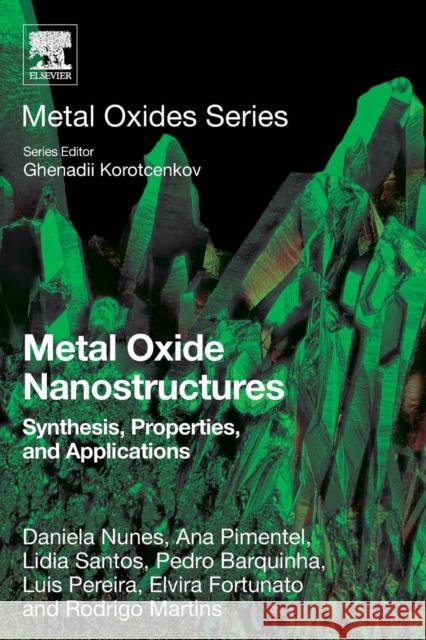Metal Oxide Nanostructures: Synthesis, Properties and Applications » książka



Metal Oxide Nanostructures: Synthesis, Properties and Applications
ISBN-13: 9780128115121 / Angielski / Miękka / 2018 / 328 str.
Metal Oxide Nanostructures: Synthesis, Properties and Applications
ISBN-13: 9780128115121 / Angielski / Miękka / 2018 / 328 str.
(netto: 766,51 VAT: 5%)
Najniższa cena z 30 dni: 798,25
ok. 16-18 dni roboczych.
Darmowa dostawa!
1. Introduction2. Synthesis and design of metal oxide nanostructures3. Structural, morphological, optical and electronic properties of the nanostructures4. Chromogenic applications5. Electronic and sensing applications. Of sensors with interesting performances6. Energy applications7. Hybrid structures and surface functionalization8. Future perspectives
Daniela Nunes is an Assistant Professor at the Materials Science Department of FCT-UNL lecturing the courses of Micro and Nanotechnology seminars and dissertation initiation.
Her research mainly focuses on electron microscopy and materials characterization. She is co-author of 50 peer-reviewed papers. She participated on the EU project, CEOPS project with the grant agreement no: 309984.
Currently Ana Pimental is working as Post.Doc on the synthesis of ZnO nanoparticles to be used in nanoelectronics.
Her main scientific interests include: Synthes of ZnO nanoparticles by microwave assisted hydrothermal method, on glass and paper based substrates, to be used in different application, such as UV sensors catalysis, platform for SERS applications, piezoelectricity and as an antibacterial agent.
Currently, she is a postdoctoral fellow at CENIMAT
i3N, in the field of electrochromic displays and biosensors, under the European project "Symbiotic with the grant agreement nº 665046 (http://symbiotic-project.eu).
She is co-author of 11 peer-reviewed papers, 1 book chapter and 1 book on this field of research and she presented her work in more than 10 international conferences. Her current research focus areas are: hydrothermal synthesis, nanostructured and nanocrystalline metal oxides, sensors and biosensors, electrochemical displays, memories and transistors.
Pedro Barquinha is an Assistant Professor at the Materials Science Department of FCT-UNL. He is also responsible for 3 research laboratories at CENIMAT focusing on electrical characterization, photolithography and nanofabrication, including the management and operation of a dual-beam SEM-FIB tool.
He has been involved in transparent electronics from 2004, covering all the areas from the design, deposition and characterization of conductive, semiconductive and insulating multicomponent oxides, fabrication and advanced characterization of oxide TFTs, to the intregation of these devices on electronic circuits (analog and digital) on flexible substrates. His work on this field contributed to take performance and integration levels of this technology to levels of great interest to the display industry.
He is co-author of 98 peer-reviewed papers, with more than 3800 citations. He co-authored 2 books and 2 book chapters on this area as well. He won important scientific prizes, such as the "Stimulus to research 2008 (Calouste Gulbenkian Foundation) and "Innovation Prize for Young Engineers 2008 (Portuguese Order of Engineers) and gave more than 30 invited lectures including 2 key-notes in international scientific conferences and workshops. He was program coordinator in ITC2012 conference and co-organizer of the 1st E-MRS/MRS-J Bilateral Symposia, "Materials Frontier for Transparent Advanced Electronics. Since 2004 he participated in more than 20 research and inovation projects, being currently principal investigator from FCT-UNL on two EU projects (FP7 i-FLEXIS and H2020 Roll-Out).
Luis Pereira is currently a researcher at CENIMAT/I3N coordinating and participating in R&D projects and has been granted in 2015 with a Starting Grant of the European Research Council on the development of cellulose nanocomposites for paper electronics (New-Fun, project 640598). His current research interests are on the design and synthesis of 1D, 2D and 3D inorganic and hybrid nanostructures, chiral cellulose nanocomposites, functional micro and nanofibers and it integration on chromogenic, electronic and electrochemical devices.
He has authored and co-authored 156 publications in peer-reviewed journals and proceedings of the ISI with more than 3500 citations.
Elvira Fortunato is full professor in Materials Science Department of Faculty of Science and Technology of New University of Lisbon, a Fellow of the Portuguese Engineering Academy since 2009 and decorated with the grade of Grand Officer of the Order of Prince Henry the Navigator by the President of the Republic in 2010, due to her scientific achievements worldwide. In 2015 she was appointed by the Portuguese President Chairman of the Organizing Committee of the Celebrations of the National Day of Portugal, Camões and the Portuguese Communities.
She was also a member of the Portuguese National Scientific and Technological Council between 2012-2015 and a member of the advisory board of DG CONNECT (2014-2015). Since November 2015 she become Deputy Adviser of the High Level Group of Scientific Advice Mechanism from DG Research & Innovation European Commission.
Currently she is the director of the Institute of Nanomaterials, Nanofabrication and Nanomodeling and of CENIMAT. She is member of the board of trustees of Luso-American Foundation (Portugal/USA, 2013-2020).
Dr. Martins earned his Ph.D. in Energy Conversion and Semiconductor Materials at the University of Lisbon in the 190s as well as Aggregate in Materials Science (Semiconductors and Microelectronics). He became full Professor of University of Lisbon and the head of the Materials Science Department. He is a full Member of CENIMAT and head of Optoelectronic and Electronic Materials Group at CENIMAT. He is a co-author of the book Transparent Oxide Electronics and more than 500 articles.
His main scientific interests include: Optoelectronics and Electronic Materials and Devices. Micro and nanoelectronics processes. Semiconductor Technologies (amorphous to crystalline). Nanomaterials and nanotechnologies.
1997-2026 DolnySlask.com Agencja Internetowa
KrainaKsiazek.PL - Księgarnia Internetowa









